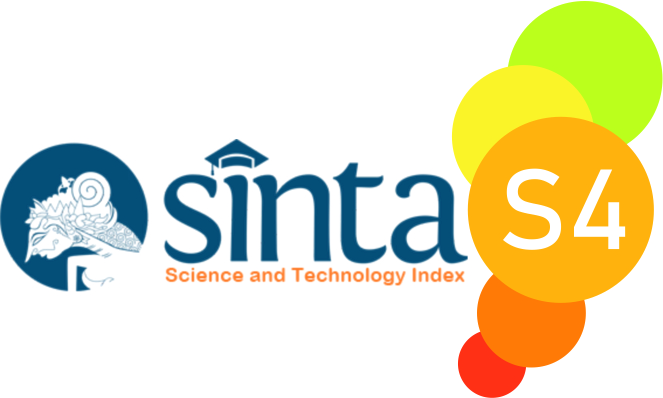Authentic Assessment of Speaking Skill In EFL Class
An Analysis on English Teachers’ Assessment Process
Abstract
The objectives of this study are to find out and determine the dominant type of authentic assessment used by teachers, the activity of authentic assessment implemented by teachers, the advantages and disadvantages of using authentic assessment in speaking class.This study used qualitative methods which employed interview, observation, and documents to collect the data. Using the purposive sampling technique, three English teachers at MA NW Perian under Yayasan Pondok Pesantren Pendidikan Darul Muttaqien (YP3DM) NWDI Perian were chosen as the participants of the study. The results of this research showed that (1) the dominant type of authentic assessment used in assessing speaking was performance based assessment; (2) the dominant authentic assessment activities used in assessing speaking were discussion, role-play and debate activity; (3) all of the English teachers agreed that using authentic assessment helped their students demonstrate and perform their true abilities without cheating; and (4) the most disadvantages felt by teachers in implementing authentic assessment in speaking class is that it consumes a lot of time because the teacher must complete the assessment everyday in every activity.
References
Ambarwati, A., & Damayanti, V. (2021). Authentic Assessment Analysis of Literary Writing Skills ‘Poetry’ Based on the Concept of Creative Thinking in Students at Ihsaniyah High School. SSRN Electronic Journal. https://doi.org/10.2139/ssrn.3852114
Ayubi, S. Al, Erlina, D., & Desvitasari, D. (2021). English Teachers’ Perception on the Use of Authentic Assessment in EFL Classroom at MA Al-Fatah Palembang. Jadila: Journal of Development and Innovation in Language and Literature Education, 2(1), 73–87. https://doi.org/10.52690/jadila.v2i1.185
Elsara, W., & Maiwen, S. (2019). English Teachers’ Difficulties in Implementing Authentic Assessment in Speaking Skill. 301(Icla 2018), 255–259. https://doi.org/10.2991/icla-18.2019.42
Evalinda, G., Haryanto, & Kisman, S. (2020). Students’ attitude toward performance-based assessment in speaking class at the state university of makassar.
Inayah, N., Komariah, E., & Nasir, A. (2019). The practice of authentic assessment in an EFL speaking classroom. Studies in English Language and Education, 6(1), 152–162. https://doi.org/10.24815/siele.v6i1.13069
Islam, R., & Musdalifah, M. (2022). Teaching Speaking Skill of English as Foreign Language in Secondary School Level. Journey: Journal of English Language and Pedagogy, 5(2), 229–239. https://doi.org/10.33503/journey.v5i2.2083
Jannah, W., & Hartono, R. (2018). English Education Journal Students’ Speaking Assessment Used by English Teachers Based on the 2013 Curriculum. Eej, 8(3), 359–369. http://journal.unnes.ac.id/sju/index.php/eej
Latipah, Y., & Purnawarman, P. (2019). EFL Teachers’ Perceptions towards the Implementation of Performance-Based Assessment in Assessing Students’ Speaking Ability. 254(Conaplin 2018), 290–295. https://doi.org/10.2991/conaplin-18.2019.57
Masruria, W. W. (2021). Exploring Self-Assessment of Speaking Skill By Efl High School Students. English Education and Art (LEEA) Journal, 4(23), 2597–3819. https://doi.org/10.31539/leea.v4i2.2285
Peraturan Menteri Pendidikan dan Kebudayaan Republik Indonesia Nomor 81a Tahun 2013. (n.d.).
Pit-ten Cate, I. M., Markova, M., Krischler, M., & Krolak-Schwerdt, S. (2018). Promoting Inclusive Education: The Role of Teachers’ Competence and Attitudes. Insights into Learning Disabilities, 15(1), 49–63. www.ldworldwide.org.
Rahmawati. (2021). Implementation of Authentic Assessment in Learning the Indonesian Language. International Journal of Educational Development and Innovation, 1(1), 2797–7528.
Rukmini, D., & Saputri, L. A. D. E. (2017). The authentic assessment to measure students’ English productive skills based on 2013 Curriculum. Indonesian Journal of Applied Linguistics, 7(2), 263–273. https://doi.org/10.17509/ijal.v7i2.8128
Syaifuddin, M. (2020). Implementation of authentic assessment on mathematics teaching: Study on junior high school teachers. European Journal of Educational Research, 9(4), 1491–1502. https://doi.org/10.12973/eu-jer.9.4.1491
Zaim, M. (2020). Authentic Assessment for Speaking Skills : Problem and Solution for English Secondary School Teachers in Indonesia. 13(3), 587–604
Copyright (c) 2023 Siti Maysuroh, Zahratul Fikni, Astrid Dwimaulani, Khaerunnisa Miraja

This work is licensed under a Creative Commons Attribution-ShareAlike 4.0 International License.

Journey: Journal of English Language and Pedagogy by http://ejurnal.budiutomomalang.ac.id/index.php/journey/index is licensed under a Creative Commons Attribution-ShareAlike 4.0 International License.






